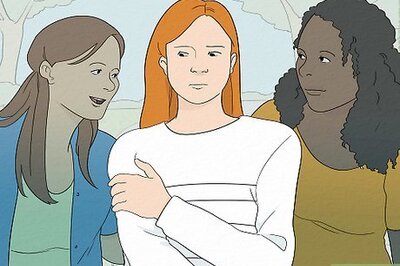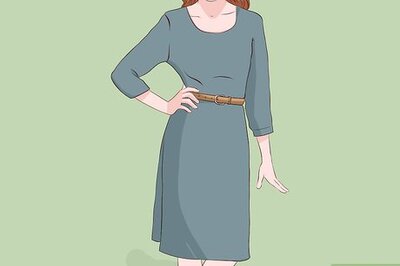
views
Los Angeles: Despite all the "Biggest Loser"-type shows on TV, all the pounds shed by their contestants and all the weight-loss products purchased by viewers, America continues to be the Biggest Gainer.
At least 10 weight-loss shows are airing these days, and on "The Biggest Loser" alone, this season's three top finalists dropped a combined 365 pounds. Yet the rest of us are just getting chubbier, with obesity rates in the United States now the highest of any industrialized nation. In fact, more people are obese today than when "Loser" premiered in 2004.
So why aren't these reality shows helping in the fat fight?
JD Roth, executive producer of "Extreme Makeover: Weight Loss Edition," thinks they actually are.
"The first step to changing some systemic problem in society is awareness and I think (weight) awareness is at an all-time high," says the 43-year-old producer, who is also behind "Biggest Loser."
Dr. Terry Schaack, medical director of the California Health & Longevity Institute, where "Extreme Makeover: Weight Loss" participants do an introductory "boot camp," says there can be a long delay between awareness and action.
"You will see nothing in national figures for probably eight to 10 years after a dramatic incident occurs," he says. "The U.S. Surgeon General went out and told people to quit smoking, I believe it was in '67. A hoard of people quit smoking, and the incidence of heart disease went down 15 or 20 years later. It takes that long."
In the meantime, in addition to "The Biggest Loser," an ample array of weight-loss shows should offer plenty of inspiration to Americans trying to slim down:
The CW's "Shedding for the Wedding" features overweight couples competing in weight-loss challenges to earn elements of their dream wedding. Oxygen's "Dance You're A(asterisk)(asterisk) Off" scores plus-sized participants on their dance abilities and pounds lost. Lifetime's "DietTribe" tracked the weight-loss progress of five real women over four months of intense diet and exercise. The Style Network has "Ruby," a series that follows its morbidly obese namesake star on her journey to regain her health. There's also MTV's "I Used to Be Fat," Discovery's "One Big Happy Family" and "A&E's "Heavy."
Two more weight-related series premiere this week: Lifetime's "Love Handles," featuring overweight couples working to heal their relationships as they shed pounds; and ABC's new "Extreme Makeover: Weight Loss Edition," which follows one super-obese subject each week and tracks that person's weight-loss progress over one year during each hour-long episode.
Yet even as the number of weight-loss shows continues to expand, so does the nation's waistline. More than 72 million Americans are considered obese and millions more are overweight.
Still, the health and fitness industry continues to flourish: Dietary Supplements bring in $26.9 billion annually, health clubs generate $24.8 billion a year, weight-loss centers take in $3.9 billion in revenue annually - and all are poised to grow. But industry-watchers say this has nothing to do with weight-related reality shows.
"Fitness shows are not driving the trends in fitness, but more grabbing onto the coattails of the success of the fitness industry," says Taylor Hamilton, an analyst with IBIS World. He attributes the growth in gym locations and memberships to an increased overall emphasis on fitness nationwide.
Shaack and dietician Paulette Lambert, who is featured on "Extreme Makeover: Weight Loss Edition," say they wish these shows offered more "teachable moments" for viewers. The format of "Makeover" lends itself to such moments, they say, since it isn't a competition such as "Biggest Loser."
Each "Makeover" episode follows only one person, and they aren't taken away to a ranch: The super-obese subjects aim to shed about half their body weight in a year through diet and exercise while still living at home.
"You've got to prove you can do it on your own, in the same environment that got you fat," Roth says. "The stakes are real. The stakes are life. It's not a million dollars or some contrived prize."
"Makeover" participants first spend a week at the California Health & Longevity Institute, a state-of-the-art facility that blends medical support with cooking classes, fitness training, healing arts such as hypnosis and spa treatments. They're led by Chris Powell, an Arizona-based trainer best known for helping 650-pound David Smith drop more than 400 pounds naturally.
His main focus with clients? Overcoming past emotional trauma and rebuilding their personal integrity and sense of self-worth.
"Until that, it's just weight loss that's being forced," says the 33-year-old Powell. "Until they deal with those emotions, it will never stick."
The subjects are shown facing setbacks and the emotional roadblocks that contribute to their dangerously overweight condition. After building trust one on one, Powell persuades participants to bare their souls on camera, telling them, "There are so many people that are suffering just like you."
Roth says he created "Biggest Loser" because he is fascinated with human transformation, and he created "Makeover" to help those who are too heavy to qualify for "Loser."
"My focus is to tell their story and to help them change their life," Roth says. "If they change their life, the audience watches and the ratings are high."
Bariatric surgeon Ted Khalili, founder of the Khalili Center in Beverly Hills, says that while many of his patients are fans of weight-loss reality shows, he isn't.
"Obesity is an epidemic and these shows are trivializing it," he says, noting that the diet and exercise plans are often extreme and unsustainable. Still, Khalili says his patients can take some eating and exercise tips from these popular programs.
Jackie Smith of Los Angeles has been a fan of "The Biggest Loser" since the beginning. The 47-year-old computer consultant says she has struggled with her weight all her life, and she's dropped about 60 pounds in recent years through tips she's taken from the show.
"It inspires me to do the right thing: Eat right, exercise," she says. "It motivates me to see them overcome the challenges, because if they can do it, I'm sure I certainly can."
Seeing oversized contestants on the show also motivates her: "Don't get like that. That's got to be so miserable."
Jaci Koloars of Omaha, Neb., also loves watching "Loser." The 32-year-old has always been active and isn't overweight, but she enjoys seeing the contestants transform their lives and bodies.
"My mom is overweight, so it kind of speaks to me in that way," she says. "I love seeing the health improvements they make, how much their lives change for the better, how their self-esteem increases. I would love to see that in my family."
Besides a $50 million market of meals, DVDs and other weight-loss products, "Loser" has also inspired an online community of show fans who are trying to lose weight themselves. "Makeover" will also include a web component with free tips and recipes for viewers.
"I really see the winners of our show as being the people who watch our show ... It inspires them to keep going or it inspires them to start," says "Loser" trainer Bob Harper, who recently introduced his own line of weight-loss supplements.
"It's sort of the tonic to make you look inward at yourself - that's what all these shows do," he says. "If we make someone look at their own life, and it's not even weight-related but it's something else they want to change in their life, to me that's the best rating of all."




















Comments
0 comment